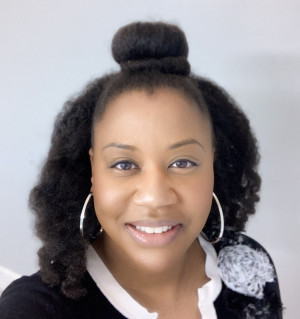___________________________________________________________________________________________
Our Continued Conversations series highlights the experts behind our content. Meet the presenters who make a difference in their fields and inspire our learners to do the same.
___________________________________________________________________________________________
 Tasha Perkins Holmes, MOT, OTR/L, has served in a variety of occupational health settings with patients in age groups spanning from toddlers to the elderly. She has spent the last decade providing school-based occupational therapy services to students. Her teletherapy service delivery model experience has allowed her to provide school-based OT services across the United States and internationally.
Tasha Perkins Holmes, MOT, OTR/L, has served in a variety of occupational health settings with patients in age groups spanning from toddlers to the elderly. She has spent the last decade providing school-based occupational therapy services to students. Her teletherapy service delivery model experience has allowed her to provide school-based OT services across the United States and internationally.
Holmes taught in the Certified Occupational Therapy Assistant Program at Central Piedmont Community College in Charlotte, North Carolina, and is a featured presenter for Continued’s AudiologyOnline, OccupationalTherapy.com, PhysicalTherapy.com, and SpeechPathology.com.
“I believe that the field of OT has so much untapped potential. It is exciting to know that you can help so many different types of people in so many different ways.”
Why did you pursue the field of occupational therapy?
I was first introduced to the field of occupational therapy in high school when my grandmother had a stroke. However, at that time, I was certain that I wanted to be a lawyer and entered college as a political science major. I quickly learned that there were going to be a lot of legal barriers standing in the way of my wanting to help people. The summer between my second and third year of college, I worked at the inpatient mental health facility where my parents both worked as RNs. I worked closely with a COTA to help patients improve their work skills. I liked the idea of being able to directly help people who were in a position of great need but knew I didn't want to be a nurse. After that summer, I went back to college and changed my major to sociology with the intent of going to graduate school for OT. I also shadowed at a local hospital and was exposed to additional areas of OT. The more I learned about the field, the more I was certain that OT was a field in which I would thrive.
What makes you so passionate about your field?
I believe that the field of OT has so much untapped potential. I attribute that frame of thought to the seeds that were sown by my graduate school professors. There are many non-traditional settings in which we can be very influential, and there are possibilities for role expansion in traditional settings. It is exciting to know that you can help so many different types of people in so many different ways. For personal growth, I am always looking for ways to learn and evolve. OT is such a dynamic profession that you can change settings if you feel stagnant. Most importantly, it has allowed me to make a positive difference in the lives of the people that I have worked with over the years.
You have a particular expertise in telehealth. Why is telehealth so important in your field, particularly in today’s climate?
Telehealth is incredibly important for providing access to patients who may otherwise have a barrier to service. In today's current health climate, telehealth is making it possible for continuity of services. It is also giving many OT practitioners the opportunity to try a new method of service delivery. Further, telehealth provides the opportunity for the most unlikely people to meet, interact, and form a bond. My first telehealth assignment was with students living in Saudi Arabia. Although many students were American, it was still fascinating for both the students and myself to be so far apart yet connected.
With occupational therapy being such a hands-on profession, how has the pandemic changed the way occupational therapists approach patient care?
As OTs, we already had the tools to pivot with our patient care. We are still looking at functional performance, still building a therapeutic rapport, and we are still doing task analysis. Telehealth requires us to really lean in to collaborating and educating caregivers and school staff, use the environment as a therapeutic tool, and build on our clients' skill sets. While it is true that telehealth can certainly test the higher limits of our executive functioning at times, there are still so many ways that clinicians can use environmental support and resources to achieve the same or similar outcomes.
Why do you like working with Continued as a presenter?
Presenting for Continued provides me the opportunity to give back to the profession. Throughout my career, there have been many people that have shared their knowledge with me directly and indirectly. Being a presenter gives me the opportunity to support my fellow practitioners. I also appreciate the questions and feedback because they create opportunities for me to be reflective.
View Holmes' courses on AudiologyOnline, OccupationalTherapy.com, PhysicalTherapy.com, and SpeechPathology.com.